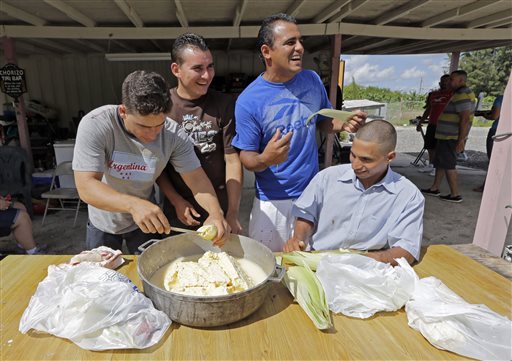Leaving Cuba: A father and son risk lives at sea

In this photo taken Sept. 28, 2014, from left, Jose Fuente Lastre, prepares a tamal as Maikel Villavicencio, Wilfredo Suarez, and Yanier Martinez Diaz, have fun during a gathering of rafters who came together risking their lives in the 110-mile journey at sea, in Miami. AP
MIAMI—It was hot and dark as 23-year-old Jose Fuente Lastre boarded a raft with eight other men, intent on fleeing Cuba. Their vessel built from scraps of metal, wood and inner tubes had failed repeatedly. Oil leaked. The propeller sputtered.
“I’m not going,” Lastre said. “It seems we weren’t meant to leave.”
“Don’t be a fool,” said his stepfather, Antonio Cardenas. “After trying this hard, you have to try again.”
Four companions decided it was too risky, jumping out and wading back to shore.
Tens of thousands of Cubans have made the harrowing journey on homemade rafts across the Florida Straits, preferring to risk their lives than remain in Cuba.
Article continues after this advertisementPresident Barack Obama’s promise to reverse 53 years of hostility has raised hopes that with normalized relations, Cubans will stop taking these risks. But Obama’s deal with President Raul Castro isn’t expected to stop the tide anytime soon. Obama lacks the votes in Congress to abandon the embargo, and the provision allowing almost all Cubans who reach the US to stay is law.
Article continues after this advertisementThis last year, the number of Cubans picked up at sea by the US Coast Guard or making it to US shores rose nearly 75 percent, from 2,129 to 3,722.
___
Lastre didn’t grow up with dreams of leaving Cuba.
He lived with his girlfriend, Yainis, and resold bread on the black market, making about $115 a month, far more than the $20 average Cuban salary. His dream was to save enough money to build a house like his stepfather’s one day.
Then he saw his neighbor Omarito disappear on a raft, and come back later with enough money to build a house and a business.
Watching American movies with Yainis, he couldn’t help but notice that even teenagers in the US had cars.
Lastre and Yainis had grown up under the revolution, never knowing life without Fidel Castro or the embargo, but far more exposed to outside influences than previous generations. About 500,000 US travelers now visit the island each year, most of them Cuban Americans. They bring stories of life in the US, cellphones and laptops.
With no close family in the US, Lastre felt he could never afford these things.
The thought of Lastre on a raft at sea made Cardenas, 50, and his wife, Olea, nervous. But if his stepson was going to try it, he wanted to protect him.
“Go and look at the raft,” Olea said. “If it looks strong, go with him.”
___
At first the skies were blue, the water calm. They drank water, ate crackers and started making plans.
“The first thing I’m going to do is get a job,” Cardenas said.
By the sixth day, they were nearly out of gas, with no sign of land.
“We should use what we have left for when we’re close to shore,” suggested Cardenas, the oldest on board.
They would need to move quickly then — If the US Coast Guard reached them in the water, they’d be sent back to Cuba.
When they woke the next day, all they saw was blue sea. Some of the men wanted to return to Cuba.
Desperate, Cardenas took out a sledgehammer and threatened to destroy the motor if anyone touched it.
The next day, the men saw a flicker of light across the sky, then another. Planes. They began rowing the boat in the same direction.
Their 10th day at sea, they kicked on the motor and sprinted toward shore, hitting sand near a condominium. They jumped out and ran barefoot to a metal gate. A guard opened the door.
“Welcome to the land of liberty!” he said.
___
In Miami, the men were treated like celebrities. Soon, though, their days looked like this: Long hours in a small hotel room, awaiting resettlement.
One month and three days later, the men woke before dawn and loaded nine duffel bags filled with donated clothes into an airport shuttle. Their destination: Portland, Oregon, where the Church World Service had arranged housing, English classes and jobs.
Three months after the men’s arrival, Obama announced efforts to restore ties with the island they left behind. The news came as a relief: Perhaps they would not have to wait years to see their families.
Had they known relations between the US and Cuba were about to improve, Cardenas said he would have risked the journey anyway.
“I’m not looking back,” he said.